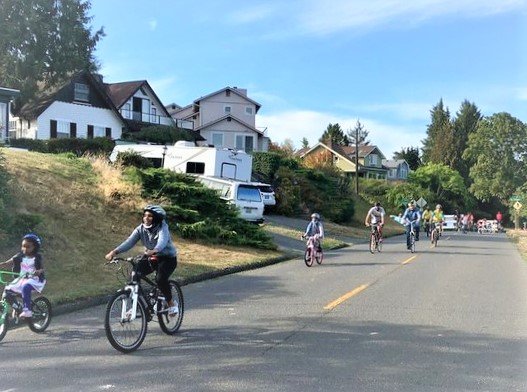Why go back, when we can build something better?
- Aug. 9, 2021

One year ago this spring, our lives turned upside down. Schools closed, businesses shuttered, we were asked to stay indoors to protect ourselves and others. So much was limited, or even prohibited, during our collective lockdown — and yet, the pandemic also opened up fresh ideas, and, in some ways, even brought out the best of us.
As a city, we rolled up our sleeves and found new ways to keep each other safe and supported: by distributing food and supplies by bike, opening up new spaces for people to travel and recreate safely via Stay Healthy Streets, converting car-parking to spaces for small businesses to survive (Cafe Streets), and so much more.
With fierce commitment, we joined the national cry for racial justice after the killing of George Floyd, and so many others, at the hands of police — rising up in local street marches and actively working to dismantle racism in our institutions. Here at SNG, we formed the Whose Streets? Our Streets! group to address traffic enforcement and the policies that govern our use of public space.
In the year ahead, Seattle could go back to the way things were before COVID, but why go back when we can build something better — a more just, sustainable, and livable city? Let’s learn from the forward strides of 2020, and make Stay Healthy Streets and Cafe Streets permanent. Let’s keep walking the path towards a more just and equitable city, because feeling safe on our streets shouldn’t depend on the color of your skin, gender, age, or physical ability.
Because it’s an election year for Mayor and the two citywide Council races, candidates and our communities will be engaged in a civic conversation about our city’s future. The citywide coalition, 15 neighborhood-groups strong, of Seattle Neighborhood Greenways will bring three big ideas to this conversation:
- People should be able to walk (or roll) to access the key goods and services of their daily lives, a concept called the 15-Minute City.
- All of Seattle’s neighborhoods should be accessible by safe, convenient — and connected — bike routes, a major campaign we’re calling UnGap The Map, to push the city to finish what it has only begun to implement in fits and starts.
- We are backing a slate of transformative, pro-equity, anti-racist policy recommendations from the all-BIPOC Whose Streets? Our Streets! workgroup for how our streets can be safe, thriving places without the use of armed police.
These ideas represent a bold re-imagining of what it can be like, and ought to be like, to move through public streets and spaces in Seattle. Cities change over time, that is inevitable, but how they change and evolve is up to us.
As I always say, we can change our streets to better reflect our values. We can hold a vision of that future Seattle that’s possible, a city that works better for all — and take action together, as we’ve been doing for the past ten years, to get there.
I’m confident we can shape a better future because people like you continue to show up and make a difference. Like many, I was inspired by Amanda Gorman’s poetry at the inauguration this year, especially her closing stanza, “We will rebuild, reconcile and recover and every known nook of our nation, and every corner called our country, our people diverse and beautiful will emerge, battered and beautiful. When day comes we step out of the shade, aflame and unafraid. The new dawn blooms as we free it. For there is always light, if only we’re brave enough to see it. If only we’re brave enough to be it.”
Thank you for bringing your light and bravery, and I hope you will find a meaningful way to get or stay involved in our people-powered movement this year.
-Gordon

Gordon Padelford
Executive Director